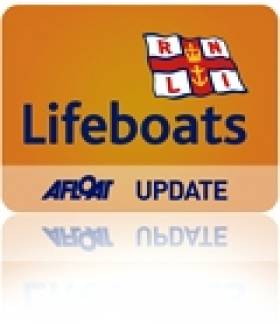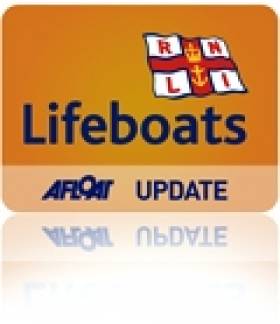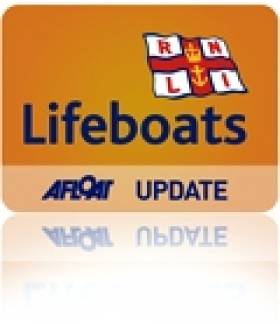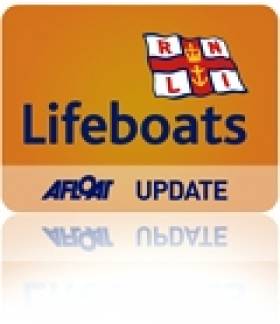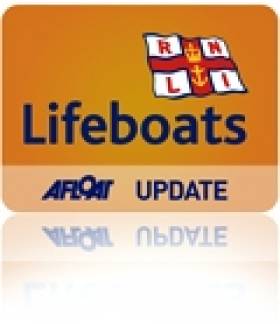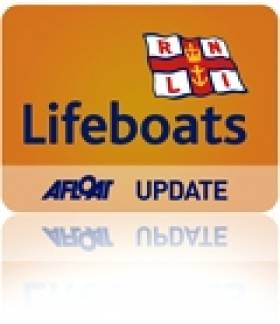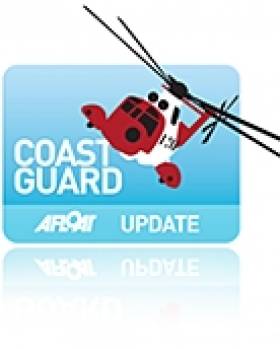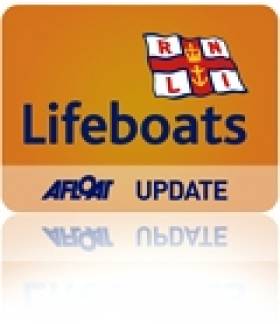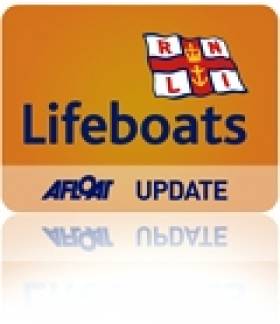Displaying items by tag: Lifeboat
Howth Lifeboat Assists Speedboat Captured on Video
On Sunday night, Howth Inshore Lifeboat assisted two people aground in a five metre speedboat North of Malahide estuary in Co. Dublin. Scroll down for the three minute RNLI video of the rescue.
In a joint operation in March, Howth Coast Guard and Howth lifeboat rescued a teenage girl who collapsed on Howth Head. The teenager had walked down a 100 foot steep cliff path to Jameson Beach on Howth Head with her friends when she collapsed. Gardai arrived on the scene and requested Coast Guard assistance to extract the casualty. Video and RNLI Video here.
Dun Laoghaire RNLI Station Names New D Class Lifeboat
One of the buisest RNLI lifeboat Stations in the country names its new D class Lifeboat 'Realt na Mara' next Saturday, April 30th.
The Dublin Bay based Dun Laoghaire lifeboat station was in action as recently as Sunday 17 April 2011 when RNLI lifeboat volunteers saved two men and two women after their speedboat hit rocks on Killiney Bay. More on that Dun Laoghaire Lifeboat rescue here.
The new lifeboat will be named at 12 noon at the lifeboat station on Dun Laoghaire's East Pier and there will be celebrations afterwards at the National Yacht Club.
The lifeboat is to be named by Mr and Mrs Pat & Kathy Kenny. RTE presenter Pat Kenny and his wife Kathy have been long-standing supporters of the Dun Laoghaire RNLI lifeboats.
The €35,000 inshore lifeboat has been largely funded through a contribution made locally. Stephen Wynne, Dun Laoghaire RNLI Lifeboat Operations Manager will be accepting the lifeboat into the care of the lifeboat station during the ceremony says; “ The naming of our lifeboat is a very special occasion for the station. It is our way of thanking the public for their generous support and how the funds raised are used.
We are very proud to be the custodians of a brand new lifeboat and we will honour the trust and investment that has been placed in us. Our new vessel will carry our volunteer lifeboat crew out to sea to save lives and bring those in trouble safely home.”
The D class lifeboat is part of the RNLI’s inshore fleet. It measures five metres in length and can carry three crewmembers onboard. It is a fast, light weight inflatable that is small and highly manoeuvrable, making it ideal for rescue close to shore. It can also be righted by the lifeboat crew in the event of a capsize. All are welcome to attend the naming ceremony.
There will be a special service of dedication and blessing and the lifeboat will put to sea after the ceremony. Réalt na Mara will be on service along with the Dun Laoghaire All Weather lifeboat Trent class lifeboat Anna Livia. Last year Dun Laoghaire lifeboat launched fifty times and brought sixty people to safety.
Related Safety posts
RNLI Lifeboats in Ireland
Safety News
Rescue News from RNLI Lifeboats in Ireland
Coast Guard News from Ireland
Water Safety News from Ireland
Marine Casualty Investigation Board News
Marine Warnings
Red Bay RNLI Station Name New Atlantic 85 Lifeboat
Red Bay RNLI lifeboat Station names its new Atlantic 85 Lifeboat the 'Geoffrey Charles' next month on Saturday, May 28th.
The busy lifeboat station was in action as recently as Sunday 17 April 2011 when RNLI lifeboat volunteers saved two men after their vessel capsized off the North Antrim Coast.
The two men were on passage from Ballycastle to Scotland in a 9 metre landing craft. Their cargo shifted resulting in the vessel capsizing throwing the two men into the water. More on that Red Bay Lifeboat rescue here.
The new lifeboat will be named at 3.30pm at the lifeboat station and there will be celebrations afterwards at Cushendall Sailing and Boating Club.
Related Safety posts
RNLI Lifeboats in Ireland
Safety News
Rescue News from RNLI Lifeboats in Ireland
Coast Guard News from Ireland
Water Safety News from Ireland
Marine Casualty Investigation Board News
Marine Warnings
11 Kayakers Rescued by Portrush Lifeboat
The callers stated that they could see a group of twelve kayakers in difficulty off Portballintrae, Causeway Coast, Northern Ireland.
Belfast Coastguard called out the Coleraine Coastguard Rescue Team and requested the launch of the Portrush RNLI lifeboats.
On arrival the Coleraine Coastguard Rescue team kept the kayakers under observation and directed the Portrush RNLI inshore lifeboat to the Kayakers. It was quickly established some of the group had become exhausted and suffering from sea sickness. Eleven of the group where transferred onto the large all weather Portrush Lifeboat whilst the Inshore Lifeboat escorted the one remaining kayaker back to Portballintrae Harbour.
The Portrush Lifeboat then transferred the eleven rescued kayakers who were mainly teenagers to the safety of Portrush Harbour.
Luckily none of the group required any medical attention.
Portrush lifeboat station adds:
Weather conditions were blustery and there was quite a swell off the coast. There was a North West wind coupled with a strong ebb tide. The tide was flowing against the wind, making conditions for the kayakers extremely difficult to return to shore. The Inshore Lifeboat (ILB) was launched first but it became clear the All-weather Lifeboat (ALB) was going to be needed to assist with the recovery of the party.
The ILB recovered 3 kayakers and returned them to Portballintrae. The ALB recovered the rest of the party and took them to Portrush Harbour.
The kayakers are safe and well, apart from suffering chronic sea sickness
Robin Cardwell Lifeboat Operations Manager said
'The fast response of the volunteer RNLI Lifeboat Crews from Portrush Station undoubtedly saved the lives of these kayakers. The sea and wind conditions made it virtually impossible for them to return to shore. Without the fast response of the crews at Portrush, this would have had a very different outcome'
Dun Laoghaire Lifeboat Rescues Four as Speedboat Hits Rocks
Four people were rescued by the Dun Laoghaire RNLI lifeboat earlier today when their small powerboat hit rocks off Killiney Beach in south county Dublin. Nobody was injured in the incident that occurred shortly after 11am while the two men and two women were enjoying a pleasure outing.
The 22-foot open powerboat hit the submerged rocks two hours after low-tide and the collision caused damage to the engine. The crew contacted the Irish Coastguard who alerted the RNLI at Dun Laoghaire and the all-weather lifeboat (ALB) launched within ten minutes.
The casualty vessel dropped anchor close to the rocks to avoid being driven onto the beach by the fresh breeze and flood tide. On arrival, the ALB launched its daughter boat with two crew that passed a tow-line to the casualty that was then brought to Dun Laoghaire.
"Before taking a boat-trip, its important to check for local knowledge that will help avoid significant hazards," commented Stephen Wynne, Lifeboat Operations Manager at Dun Laoghaire. "The four people rescued were all wearing life-jackets and followed the correct procedure in calling for assistance."
Bundoran RNLI Lifeboat Rescues Swimmer
Commenting after the call out, lifeboat press officer Colm Hamrogue said, "We are delighted that the young swimmer is home safe and sound. We also want to thank the member of the public for calling out the lifeboat. We advise everybody to take care when enjoying the water over the coming summer months. It is important to follow safety advice when taking to the water.
Irish lifeboat rescue news here
While lifeboat crew assembled, Belfast Coastguard broadcast a requested for any vessel in the vicinity of Groomsport to give all necessary assistance to the stricken vessel and her crew.
Fishery Protection Vessel Banrion Uladh was making her final approach to Bangor Harbour when the rescue alert was received. Understanding the urgency of the situation Captain Eccles responded immediately and ordered full speed towards the grounded vessel.
When on scene the Banrion Uladh launched a Rigid Inflatable Boat which was able to transfer four children from the stricken boat to the safety of the Fishery Protection Vessel. The speedboat was successfully towed off the reef. With the owner onboard RNLI Bangor Lifeboat towed the vessel to the safety of Bangor Harbour.
Captain Eccles of the Banrion Uladh also a RNLI volunteer at Bangor used this opportunity to highlight the RNLI's free sea safety check when he said 'The RNLI is a charity dedicated to ending preventable loss of life at sea, with hopefully good weather on the horizon and the boating season fast approaching it would be an ideal time for boat owners or skippers to think about a sea safety check. This free check offers excellent sea safety advice along with practical advice on what to do in an emergency. You can book your free sea safety check by contacting the RNLI Sea Safety Officer Peter Bullick on 07802 537371, he would be delighted to hear from you.'
DSC Radio Distress Alert from Ireland Triggers Major Search
At 7.50pm on Saturday, Holyhead Coastguard received a VHF DSC automated distress alert, with no position and a search was launched involving four lifeboats, three Coastguard Rescue Teams and Rescue Helicopter 122 from RAF Valley. The search area encompassed 706 square miles.
Holyhead Coastguard identified the MMSI for the radio unit to be from a derelict fishing vessel in the Republic of Ireland and Dublin Coastguard confirmed the vessel had been broken into at some point and the radio unit taken. Without the details of any new vessel and current owner of the radio unit, Holyhead Coastguard was unable to determine if the distress alert was genuine or a false alert without a search.
Holyhead Coastguard Watch Manager Andy Carroll said,
"Anyone buying a second hand VHF DSC radio must ensure the details are updated on the MMSI database and familiarise yourself with how to operate the unit and how a distress alert is made. This is vital for an effective search and rescue operation should you get into difficulty."
Andy went on to say,
"If you think you have inadvertently sent an automated distress alert, don't hesitate to get in contact with the Coastguard. We would much rather know that it is a false alarm than continue searching needlessly."
VHF DSC and MMSI – explanation of terms used:
Carrying a VHF radio on your vessel is vital and VHF DSC (Digital Selective Calling) is strongly recommended. Ensure your radio equipment is fully working and you know what to do in an emergency. With DSC you can send a distress alert along with your exact position, with one touch of the button. The distress alert is repeated every four minutes until it is acknowledged either by a Coastguard Station (Ship to Shore) or by a vessel (Ship to Ship) within radio range.
Ensure you have updated your MMSI details – this is especially important if you have just bought the boat with a radio already installed or you are installing a new DSC, radio set. Maritime Mobile Service Identity ( MMSI) numbers are programmed into a DSC radio set and an MMSI is issued as part of your radio licence application, via Ofcom. It consists of a series of nine digits, which are used to uniquely identify the radio on your vessel.
Engine Failure on Lough Derg Leads to Lifeboat Rescue
At 15.49hrs on Sunday April 17 the Lough Derg RNLI Lifeboat was requested to launch by Valentia Coast Guard to assist five persons and their two dogs aboard a vessel adrift off Whitegate, on the County Clare side of Lough Derg. At 16.02 the lifeboat launched with helm Eleanor Hooker, Colin Knight and Ger Egan on board. The lake was calm with a light south-easterly wind, Force 2-3. Visibility was very good. The lifeboat came alongside the casualty vessel at 16.10hrs and found that all persons, four adults, one child and two dogs, were safe and unharmed. The casualty vessel had dropped anchor to prevent being pushed aground onto nearby rocks. With an RNLI crew member onboard, the cruiser was towed to the safety of the public harbour at Garrykennedy.
The skipper of the vessel thanked the crew of the lifeboat. He said 'I saw the lifeboat out training earlier this morning and never imagined you would be helping me in the afternoon. It's great to know you're there'.
The lifeboat returned to station and was ready for service again at 17.00hrs
The two men were on passage from Ballycastle to Scotland in a 9 metre landing craft. Their cargo shifted resulting in the vessel capsizing throwing the two men into the water. The alarm was raised shortly after 7am.
Red Bay RNLI Lifeboat crew located the men who had been in the water for over an hour two miles east of Torr Head. The men who were suffering from shock and Hypothermia were taken to Cushendall by the Lifeboat were they were met by an ambulance crew and taken to Antrim hospital.
Commenting on the rescue Red Bay RNLI lifeboat helm Paddy McLaughlin said, "The two men had been in the sea for over an hour and were feeling the effects of it as the lifeboat crew arrived. We administered first aid at the scene and transferred the casualties to shore immediately where they were met by ambulance."
This is the second callout for Red Bay volunteer lifeboat crew in 24 hours. Two divers were recovered from Cushendun yesterday afternoon after they got separated from their dive boat.



























